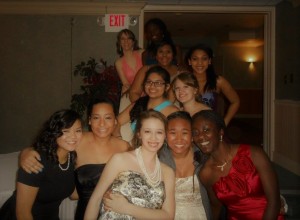As a high school senior, I really didn’t know what I was doing when it came to college. The year was 2012, I was seventeen, and I still had no clue which college to attend. I procrastinated up to the line, until it was National College Decision Day and I was forced to finally choose. Originally planning to attend college in Los Angeles, I settled on Calvin College in Grand Rapids, Michigan, thousands of miles from my home in California. I had visited Calvin a month earlier, in April, and toured the newest dorm, named Van Reken after one of the many Dutch alumni who sponsor Calvin. My mom had discovered a living-learning floor for Honors students and, being an overachiever in her college days, encouraged me to apply.
By June, I dragged myself onto the Calvin website to fill out the Honors floor application. However, a description of another floor in the same building caught my attention. Called Grassroots, the floor was dedicated to exploring multiculturalism and combating racism. Every two weeks, students were required to attend a one-credit Contextual Diversity class, which investigated racism in modern America. Forget the Honors floor; I knew I had to apply.
My parents had become involved in anti-racism work before I was born. They were the area directors for Young Life, a Christian program for students, in Kalamazoo, Michigan, for eight years. My dad had become involved in diversity trainings around the time when my parents married, and as a result, tried to integrate the largely white youth groups in suburban Kalamazoo with the largely black youth groups in other parts of the city. He was met with opposition, so, frustrated, my parents decided to relocate to Sacramento, California.
My parents’ vision was to form a multicultural community, with a church at its center, that fostered sharing life and learning from each other. They brought together groups of people that normally would never interact. And it was harder than they could have imagined. There was conflict, there was fallout, there was pain. But there was also compassion, and mutual benefit, and true friendship.
It was in this environment that I was raised. I had seen the heartbreak, but I had also seen raw connection that resulted in rich learning. By the time I was applying to live on intentional living-learning communities in college, I was hungry for that type of interaction. Even as a seventeen-year-old, I knew I wanted to engage in racial justice work.
Several months later, I moved onto Grassroots as a freshman. The floor was was the catalyst for not only my interests, but also who I was as a person. I was launched into community, and I had no clue what I was getting myself into: late-night talks about race theory, arguments, and the formation of lasting friendships. I was terribly uncomfortable, I learned a lot, it was the best and hardest two years of my life.
Grassroots was a crucial step for me on a journey I hope to continue to take.
By Anna Lindner
Anna is a Campus Clipper intern and a first-year student in NYU’s Media, Culture, and Communication program. Her research interests include critical race and gender theory and their resultant intersectionality. When she’s not studying, Anna enjoys visiting friends, catching up on TV shows, and lifting weights. For over 20 years, the Campus Clipper has been offering awesome student discounts in NYC, from the East Side to Greenwich Village. Along with inspiration, the company offers students a special coupon booklet and the Official Student Guide, which encourage them to discover new places in the city and save money on food, clothing and services.
At the Campus Clipper, not only do we help our interns learn new skills, make money, and create wonderful e-books; we give them a platform to teach others. Check our website for more student savings.



